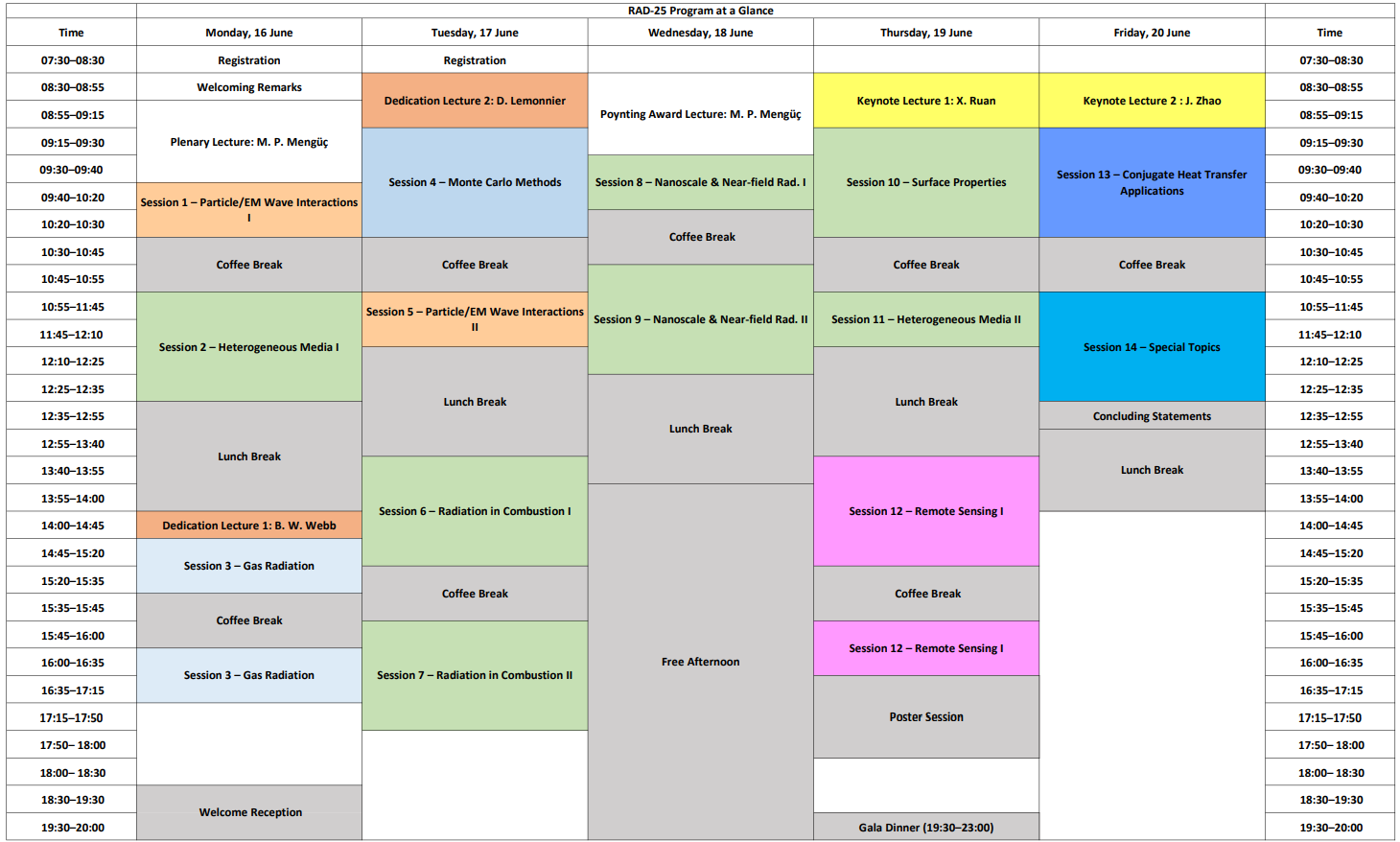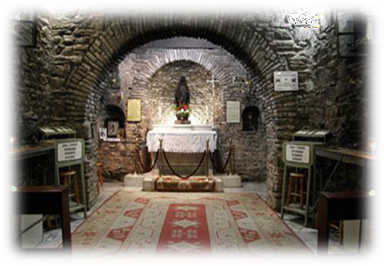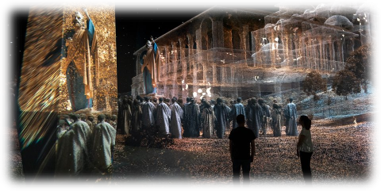RAD-25
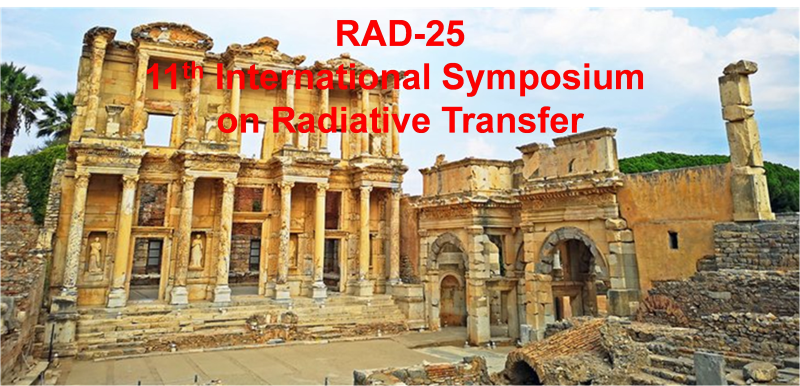 |
The 11th International Symposium on Radiative Transfer (RAD-25) will be held in KoruMar Hotel De Luxe, Kuşadasi, Türkiye, on June 15-20, 2025. RAD-25 is built on the success of ten previous Radiation Symposia held in Kuşadasi, 1995, 1997, in Antalya, 2001, in Istanbul, 2004, in Bodrum, 2007, in Antalya, 2010, in Kusadasi, 2013, in Cappadocia, 2016 in Athens, 2019, and in Thessaloniki, Greece, 2023. As before, the main objective of the Symposium is to bring together scientists and engineers involved in radiative transfer research and to provide a relaxed atmosphere for in-depth discussion of theory, experiments, and applications.
The Symposium will also serve as the formal presentation venue for the 2025 Viskanta Young Scientist Award.
CONFERENCE TOPICS
A wide range of topics related to classical and emerging areas of radiative transfer and their applications will be covered, including but not limited to:
- Novel numerical, analytical and hybrid techniques for the solution of radiation transfer equation in multidimensional and complex geometries
- Radiative transfer in optically complex media (anisotropic properties, graded index, etc.)
- Advanced radiative transfer models for industrial and combustion systems including furnaces, gas turbines, engines, clean combustion and novel propulsion concepts
- Radiative properties of gases, particles, agglomerates and non-homogenous structures
- Interaction of radiation with conduction, convection, turbulence, chemical kinetics, and soot formation
- Inverse solution techniques in radiation applications
- Innovative application of radiative transfer for improved manufacturing processes
- Fundamentals and applications of radiative transfer to remote sensing
- Radiative transfer in atmospheres, oceans and climate-related problems
- Biomedical applications of radiation transfer
- Nano- and micro-scale radiative transfer
- Radiative transfer-based diagnostic systems
DEDICATION
This symposium is dedicated to Professor Brent W. Webb and Denis Lemonnier who have made significant contributions to the international radiation transfer community.
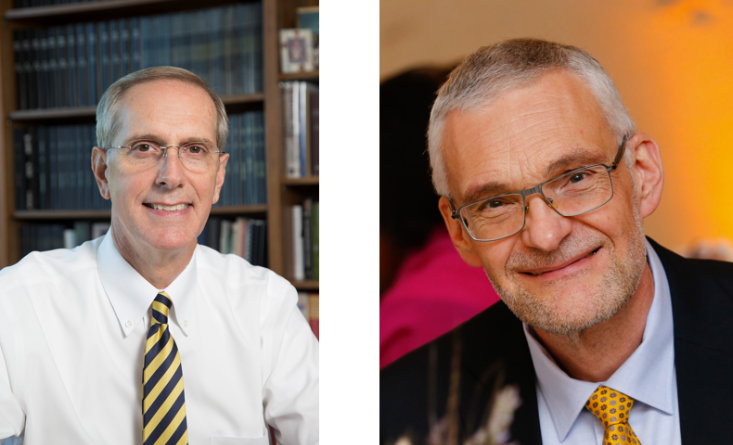 |
|
| Brent W. Webb | Denis Lemonnier |
As you will remember,
- The 10th Symposium on Radiative Transfer (RAD-23) was dedicated to Professors Z. Zhang and S. Kumar in 2023,
- The 9th Symposium on Radiative Transfer (RAD-19) was dedicated to Professors P. Coelho and F. Liu in 2019,
- The 8th Symposium on Radiative Transfer (RAD-16) was dedicated to Professors S. W. Baek and A. Soufiani in 2016,
- The 7th Symposium on Radiative Transfer (RAD-13) was dedicated to Professors Y. Bayazitoglu, S. Maruyama and G. Flamant in 2013,
- The 6th Symposium on Radiative Transfer (RAD-10) was dedicated to Professors N. Selcuk, P. M. Menguc and J. Taine in 2010,
- The 5th Symposium on Radiative Transfer (RAD-07) was dedicated to Professors A. Charette, L. A. Dombrovsky and M. F. Modest in 2007,
- The 4th Symposium on Radiative Transfer (RAD-04) was dedicated to Professors J. R. Howell, Y. Kurosaki and J. F. Sacadura in 2004,
- The 3rd Symposium on Radiative Transfer (RAD-01) was dedicated to Professors M. Lallemand, M.N. Ozisik and R. Viskanta in 2001.
Dedication lectures
-
High accuracy, computationally efficient modeling of radiation transfer in gases
Brent W. Webb
Professor of Mechanical Engineering at Brigham Young University, Provo, Utah USA
-
Effect of radiation on natural convection in semitransparent gaseous media
Denis Lemonnier
Senior Researcher at French National Centre for Scientific Research
Biographies
-
Prof. Brent Webb received his PhD from Purdue University in 1986, and joined the Mechanical Engineering faculty at Brigham Young University immediately thereafter. He has served the university as Director of the Research Office, Vice President for Research, and Academic Vice President. Professor Webb has been past Associate Editor of the ASME Journal of Heat Transfer, and is currently Associate Editor of the Journal of Quantitative Spectroscopy and Radiative Transfer. He is an ASME Fellow, ICHMT Fellow, and is recipient of the 2016 ASME Heat Transfer Memorial Award. He serves on the Executive Committee of the International Centre for Heat and Mass Transfer, and served as 2022-2023 Chair of the Executive Committee of the ASME Heat Transfer Division. He served as Co-chair of the past five International Symposia on Radiative Transfer. Professor Webb is author of some 260 technical publications, including 145 archival papers and eight invited reviews, and he has presented over forty invited lectures.
- Dr. Denis Lemonnier graduated in mechanics and aeronautics from ENSMA, Poitiers in 1980 and obtained his doctorate in 1986. He is now an Emeritus Senior Scientist at the French National Council for Scientific Research (CNRS). Former director of a heat transfer research unit, he was deputy director of Head of ENSMA until December 2022. His research activities take place at the Institut Pprime, Poitiers: they mainly concern radiation in absorbing dense or gaseous media and the simulation of coupled transfers in convective flows. He is an Associate Editor of the Journal of Quantitative Spectroscopy and Radiative Transfer, and a permanent chair of a EUROTHERM seminar series devoted to thermal radiation. Together with Brent W. Webb, he has chaired the last five radiative transfer symposia organised by the International Centre for Heat and Mass Transfer (ICHMT). He is a member of the directorate of the French Society of Heat Transfer (SFT), a French delegate at the EUROTHERM Committee, and a member of the Scientific and Executive Committees of the ICHMT.
INTERNATIONAL SCIENTIFIC COMMITTEE
| K.J. Daun (Co-Chair) | University of Waterloo | Canada |
| F. Liu (Co-Chair) | National Research Council of Canada | Ottawa, ON, Canada |
| F. André | Université de Lille | France |
| Y. Bayazitoğlu | Rice University | Houston, TX, USA |
| P. Boulet | LEMTA, Université de Lorraine, | Nancy, France |
| P. Coelho | Instituto Superior Tecnico | Lisbon, Portugal |
| J. L. Consalvi | Aix-Marseille Université | France |
| L. A. Dombrovsky | Russian Academy of Science | Moscow, Russia |
| M. El Hafi | RAPSODEE, IMT Mines Albi | France |
| H. Ertürk | Department of Mechanical Engineering, Boğaziçi University | Istanbul, Türkiye |
| F.H.R. França | Universidade Federal do Rio Grande do Sul | Brazil |
| M. Francoeur | Department of Mechanical Engineering, University of Utah | Utah, USA |
| S. Haussener | ETH Zurich | Switzerland |
| P.-F. Hsu | Florida Institute of Technology | Melbourne, FL, USA |
| J.R. Howell | University of Texas | Austin, TX, USA |
| S. Kumar | Polytechnic Institute of NYU | New York, NY, USA |
| D. Lemonnier | Institut Pprime | ISAE-ENSMA, Poitiers Futuroscope, France |
| W. Lipiński | The Cyprus Institute | Nicosia, Cyprus |
| L. H. Liu | Harbin Institute of Technology | China |
| M.P. Mengüç | Ozyegin University | Istanbul, Türkiye |
| M.F. Modest | University of California | Merced, CA, USA |
| A.V. Nenarokomov | Moscow Aviation Institute | Russia |
| B. Rousseau | LTEN | Polytech’Nantes, France |
| T. Ren | Shanghai Jiao Tong University | Shanghai, China |
| S. Roy | Marquette University | Milwaukee, WI, USA |
| V. P. Solovjov | Brigham Young University | Provo, UT, USA |
| A. Soufiani | EM2C | Centrale Supelec, Paris-Saclay, France |
| L. Wang | Arizona State University | Tempe, AZ, USA |
| B. W. Webb | Brigham Young University | Provo, UT, USA |
| Z. Zhang | Georgia Tech | Atlanta, USA |
| H.-C. Zhou | China University of Mining and Technology | China |
Plenary lectures
In addition to dedication lectures (see the dedication section) two keynotes lectures will be delivered by renowned specialists in radiative transfer.
-
Pushing the Limits of Radiative Heat Transfer: Ultrawhite Cooling Paints and Phonon-Engineered Near Field Radiation
Xiulin Ruan
- Photon Tunneling Mediated Heat Transfer in Particle Networks: From Particle Scale to Continuum Scale
Junming Zhao
Professor, School of Energy Science and Engineering, Harbin Institute of Technology, Harbin 150001, China
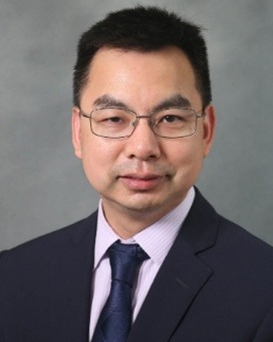 |
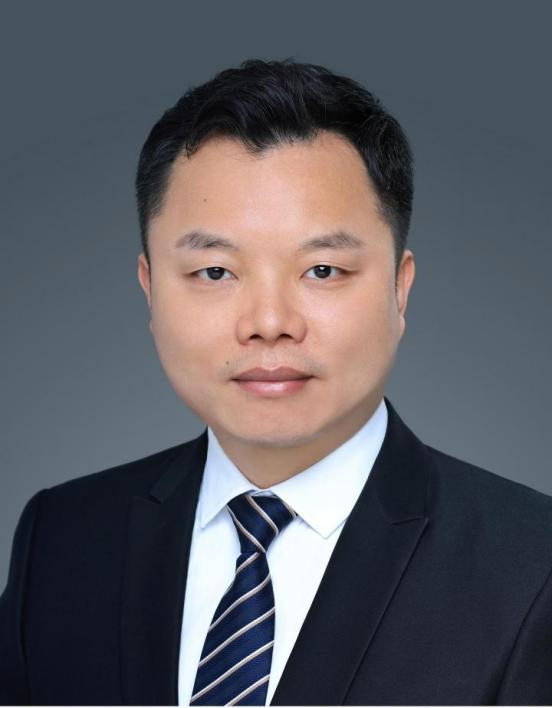 |
|
Xiulin Ruan |
Junming Zhao |
Biography
Dr. Xiulin Ruan is a professor in the School of Mechanical Engineering and Birck Nanotechnology Center at Purdue University. He received his B.S. and M.S. from the Department of Engineering Mechanics at Tsinghua University, in 2000 and 2002 respectively. He then received an M.S. in electrical engineering in 2006 and Ph.D. in mechanical engineering in 2007 from the University of Michigan at Ann Arbor, before joining Purdue. His research and teaching interests are in predictive simulations, scalable manufacturing, and multiscale characterizations of thermal transport materials and systems. Among his honors are the ASME McDonald Mentoring Award (2024), International Phononics Society Brillouin Medal (2023), Time Magazine’s Best Inventions (2023), Guinness World Record (2022), and NSF CAREER Award (2012). He is a fellow of the American Society of Mechanical Engineers.
Dr. Junming Zhao is a professor in the School of Energy Science and Engineering at Harbin Institute of Technology (HIT). He received his PhD degree in Engineering Thermophysics in 2007, and his BEng in 2002, both from HIT. His research focuses on radiation heat transfer, particularly radiative transfer theory and numerical models for complex system, nanoscale and near-field radiation heat transfer, with applications in spacecraft thermal control, solar energy utilization and radiative properties measurement. He was the winner of JQSRT/Elsevier Viskanta Young Scientist Award in 2016. He serves as a member of the Scientific Council of the International Centre for Heat and Mass Transfer and the Youth Committee of Mass and Heat Transfer of Chinese Society of Engineering Thermophysics.
SCHEDULE OF DATES
Full Papers:
| January 26, 2025 | Electronic copies of manuscripts, maximum 8 pages, to be sent to F. Liu |
| April 1, 2025 | Notification of acceptance |
| April 15, 2025 | Final, camera-ready manuscripts (in pdf and MS Word document) to F. Liu |
| May 5, 2025 | Registration fee and hotel room charges to ICHMT Secretariat |
Posters:
| April 1, 2025 | Electronic copies of 1-page Abstracts to F. Liu |
| April 15, 2025 | Notification of acceptance |
| May 1, 2025 | Final, camera-ready extended abstracts in pdf or doc format (to ICHMT Secretariat) |
| May 5, 2025 | Registration fee and hotel room charges to ICHMT Secretariat |
LOCATION & ACCOMMODATION
The Symposium will take place at KoruMar Hotel De Luxe, KoruMar Hotel De Luxe is a five-star hotel in Kusadasi and located in the peaceful and tranquil atmosphere. At the hotel, which awaits you in the magnificent atmosphere of the Aegean coast, you can meet the sparkling sea and warm sun. The hotel also has its own pier, where you can use sunloungers, mats and parasols free of charge. The hotel is located 2 km from the centre of Kuşadası, 70 km from Izmir Adnan Menderes Airport, and 20 km from the ancient city of Ephesus.
The address of the conference center: Türkmen Mah. Gazi Beğendi Bulvarı No:21 09400 Kuşadası/Aydın Türkiye.
Map: Korumar Hotel De Luxe from Google Maps
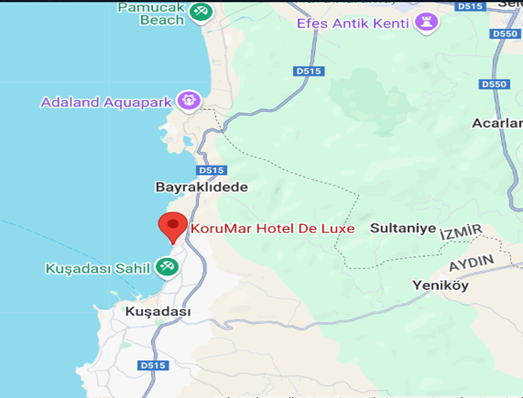
For information about Visa requirements please visit: https://www.evisa.gov.tr/en/
--------------------------------------------
Hotel Accommodation in KoruMar De Luxe (including meeting package):
(All hotel reservations of the conference will be held by CLAROS TOUR with the following discounted pricing for the conference participants)
Single Room (per night)*: 209 EUR
Double Room (per night)*: 264 EUR
Triple Room (per night)*: 360 EUR
Cocktail + Gala Dinner : 115 EUR
5 day package single room (including Cocktail and Gala dinner): 1160 EUR 1100 EUR
5 day package double room per person (cocktail and gala dinner included) 715 EUR
If you want to stay at sea view room, please inform us (sea view suppl. per room per day 12 EUR)
* A child (age between 0-6) stays free of charge, or a child (age between 7-12) stays with 50% discount in the same double room with the parents. For a second child (age between 7-12) in the same room, 50% discount will be applied.
**Since the venue is an All-Inclusive hotel, the participants who prefer to stay in another location need to pay the fee for the daily use of the hotel facilities.
External Participant (without accommodation in KoruMar De Luxe)
(Daily use : using Hotel facilities between 9:00 – 18:00 (including lunch, pool, coffee breaks)
Daily Use (single person per day)**: 95 EUR 45 EUR
Cocktail + Gala Dinner : 130 EUR
To foster interactions and enhance networking, participants are encouraged to stay at the conference hotel. The organizing committee can assist in pairing participants for double-room accommodation at the conference hotel.
Cancellation / Refund Conditions
All cancellation requests must be reported in writing to kongre@claros.com.tr and ichmt@ichmt.org
In case of hotel cancellation request made before April 15, 2025, 50% of the remaining amount after bank transfer costs are deducted will be refunded after the Congress.
No refund will be made for hotel cancellations made after April 16, 2025.
TRANSPORTATION FROM AIRPORT TO KORUMAR HOTEL DE LUXE
(Please note that there are two Korumar Hotels. Our hotel is KoruMar Hotel De Luxe)
From ”Adnan Menderes” Airport (ADB) to KoruMar Hotel De Luxe
By Train / IZBAN : You can get the boarding pass from the box office at the airport Izban stop. Izban cannot be boarded without this card.
From Izmir Adnan Menderes Airport, take the Izban (train) public transportation to Tepeköy direction. Get off at the last stop Tepeköy stop and take the Selcuk Izban which will continue in the same direction.
When Izban reaches the last stop in Selçuk, get off and go to Selçuk bus station through the bazaar. And from here take the Kusadasi minibuses and get on by saying that you will get off at KoruMar Hotel De Luxe.
By Bus / HAVAS Bus : Our passengers can get service from the bus company at the exit of the terminal on the arrivals floor of domestic/international terminals. They should get off the Havaş bus at Kuşadası bus station and tell the name of the hotel to the city minibuses driver there. The driver will show which bus should be taken.
You can check the hours from https://havas.net/otobus-hizmetleri
By Taxi : approximately 75- 80 Euros from ADB to KoruMar Hotel De Luxe.
Distances from the hotel
Selçuk City Center 2 km
Adnan Menderes Airport 70 km
İzmir 80 km
Ephesus Ancient City 20 km
Church of Virgin Mary 21 km
Didim 68 km
Miletus Ancient Theater 56 km
Pamukkale 200 km
REGISTRATION
RAD-25 Symposium will have both oral and poster presentations. The official language of the conference is English. Participation is open to all persons interested in this conference. Please note that all persons intending to attend RAD-25 must complete the Registration Form and should register. At least one author must be registered by May 5, 2025, for the paper to be included in the Symposium Program and available online on the Symposium website.
|
|
Before May 5 |
After May 5 |
|
Regular |
550 EUR |
600 EUR |
|
Student |
250 EUR |
300 EUR |
|
Cocktail + Gala dinner (per person) |
115 EUR |
115 EUR |
The fees for both regular and student cover participation in all technical sessions, symposium proceedings (on a flash disk), book of abstracts, coffee breaks, but does not include sight-seeing tours, trips, and airport transfers.
In case of cancellation after the payment, 100 Euros will be deducted from the paid registration fee and the rest will be reimbursed.
The Registration & Room Request form for RAD-25 can be accessed by clicking on this link.
The only payment method for this symposium is bank transfer. However, you can make your payment on-site at the registration desk in cash (preferably) or by credit card (American Express card is not acceptable. Please use MasterCard or Visa for your payment). For credit card payments, 5% bank commission must be calculated. For bank transfers, please send a copy of the bank transfer document to ichmt@ichmt.org so that your payment can be traced. If the bank withholds a transfer fee from the total amount, we will ask you to pay the outstanding amount on-site in cash.
Bank Details of Claros Tour for payment in EUROS:
(Claros Tour (Alico Turizm Ltd. Sti.) is the official Travel Agency of ICHMT.
ACCOUNT HOLDER: Alico Turizm Gıda Ins. San. ve Tic. Ltd.Şti.
ADDRESS OF ACCOUNT HOLDER: Ismet Kaptan Mah. Sair Esref Bulv. No 35/1 D 803 Konak/Izmir, Turkiye
BANK: Turkiye Is Bankasi, Yeni Liman Subesi
BANK ADDRESS: Atatürk cad. No: 422, 35220, Alsancak, Izmir, Turkiye
ACCOUNT NO: 3427 0443494
SWIFT CODE: ISBKTRIS
IBAN: TR02 0006 4000 0023 4270 4434 94
PRESENTATIONS / PUBLICATIONS
The Symposium will have both oral and poster presentations.
Research communications are strictly limited to maximum 8 pages and must clearly state the purpose, the findings, and the originality of their contribution. Acceptance for oral presentations will be based on peer review of these communications. Communications accepted for presentation will be published by Begell House, Inc., in a proceedings volume and will be available in the form of flash memory disks to the participants at the registration.
After the conference, authors of contributed papers will have the opportunity to submit an improved/enhanced version of their work, still based on their presentation content. These submissions will be considered for publication in a special issue of the Journal of Quantitative Spectroscopy and Radiative Transfer, after undergoing a rigorous review process following the guidelines of the Journal.
The Symposium will also include poster sessions to allow researchers to discuss their most recent work in a relaxed atmosphere. Selection for the poster session will be based on one-page abstracts only, and no further text is required for the posters. The abstracts for poster presentations will be included in the proceedings.
All authors are expected to send their contributed papers or abstracts (for posters) in camera-ready format (in PDF) electronically. The guidelines for preparing camera-ready papers will be available on the Symposium website, http://www.ichmt.org/rad-25.
| Conference Statistics | |
| RAD - 25 | |
| Total number of attendees | 68 |
| Number of student attendees | 27 |
| Number of countries represented | 12 |
| Number of oral presentations | 63 |
| Number of poster presentations | 6 |
| Number of face to face participants | 68 |
| Number of keynotes | 2 |
| Number of dedication lectures | 2 |
| Journal(s) for post-conference publication | Journal of Quantitative Spectroscopy and Radiative Transfer |
| Special awards | The 2025 Elsevier/JQSRT Poynting Award on Radiative Transfer The 2025 Elsevier/JQSRT Raymond Viskanta Young Scientist Award |
GUIDE FOR AUTHORS
Communication texts
Manuscripts must be submitted in electronic form in PDF format, using A4 size (210 ´ 297 mm). Any word processing utility (e.g. MS Word, OpenOffice, LaTeX) may be used to generate the manuscript provided that it is converted to PDF for submission. The symposium organizing committee has prepared and made available this template in both MS Word and LaTex format. Those choosing to use other word processing platforms are responsible for generating their manuscript using this template as a model and in the format prescribed in this document. The text should be single-spaced. If superscripts or subscripts make this a problem, wider spacing may be necessary. Leave double spaces between paragraphs. Begin paragraphs flush at the left margin without indentation. The typing area of all pages should be 170 x 257 mm with equal margins on left and right, top and bottom (20 mm). Each page should be completely filled with typing and/or diagrams (except perhaps the last page). Authors should use Times or Times New Roman, 12-point font for the text. The authors must assure that all symbols and equations will be correctly displayed in the PDF version. The text should be left and right justified. The total length of a paper, including all figures, tables and references, should be no more than 8 pages (and not less than 5 pages). Manuscripts are therefore expected to provide a very concise description of the work being presented. They must, however, clearly state the purpose, the methodology, the main results and the originality of the study.
A signed “Copyright Release Form” must also be submitted with each manuscript. You can download the "Copyright Release Form" by clicking here.
The complete guidelines for authors are detailed in these two templates:
Posters
Selection for the poster session will be based on one-page abstracts only.
You can download a MS WORD template here. Please use it as model if you choose another word processing tool.
You can download the "Suggestions for Preparing Posters" by clicking here.
TOURS:
During the RAD-25 Symposium, which will be held in Kuşadası, Aydın Türkiye, on June 15-20, 2025, CLAROS TOUR will be pleased to organize city tours or any other assistance you may need during this event.
For more information about these and other services, please contact:
CLAROS TOUR, kongre@claros.com.tr - (www.claros.com.tr)
Phone: +90 (532) 622 06 93
NOTE: During the Symposium, a representative of CLAROS TOUR will be available at the Conference Center next to the reception for any last minute requests or practical assistance.
Ephesus & the House of Virgin Mary Half day Tour
| After lunch at the hotel, a short drive to Bulbul Dagi (Mount Koressos) and the shrine of the Virgin Mary. It is believed that St John brought the Virgin Mary here and that she lived in the house on which the present shrine was built. It is now a popular pilgrimage site for both Christians and Muslims. |
|
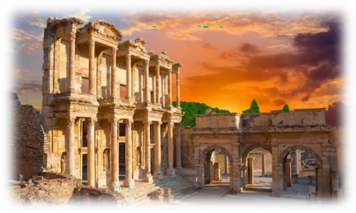 |
|
A visit to Ephesus - once a commercial centre of the ancient world - is a must when in Turkey. The city was dedicated to the goddess Artemis, whose magnificent temple (one of the Seven Wonders of the World) has been rebuilt several times. In Ephesus you will visit a theatre, a gymnasium, an agora, baths and the library of Celsus. The new Ephesus Experience Digital Museum offers an immersive journey through ancient history with cutting-edge technology.
| 13:30 | Departure from Hotel |
| 14:00 | Arrival to House of Virgin Mary , visit House of Virgin Mary Departure to |
| 15:00 | Ancient Ephesus City |
| 15:20 | Ancient Ephesus City visit |
| 17:00 | Departure to the Hotel |
Included Services: Entrance fees of Ephesus, Experience Museum & the House of Virgin Mary. Professional English-speaking Tour guide, parking and A/C Vehicle.
Non-Included Services: Ephesus Terrace houses entrance and all other expenses
Per Person : 135.-EU (based on minimum of 10 participants)
Şirince Village Tour Half Day Tour
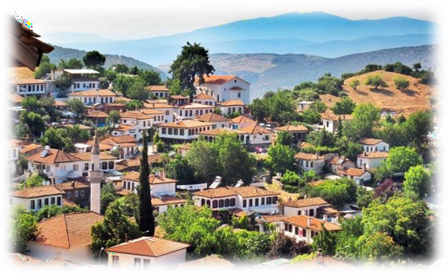
9 km east of Selçuk is Şirince, known for its traditional 19th century village houses. Some have been converted into guest houses. Wine is produced in this small hillside Turkish village which itself resembles an open-air museum and there are also wine houses for tasting wines.
Departure from the hotel, arrival at Şirince Village, walking tour, the guest could have a wine tasting if they wish.
| 14:00 | Departure from Hotel |
| 14:30 | Arrival to Sirince Village |
| 15:00 | Free time in Şirince Village |
| 17:30 | Departure to the Hotel |
Included Services: Professional English-speaking Tour guide, parking and A/C Vehicle.
Non-Included Services: All other expenses
Per Person: 55.-EU (based on minimum of 10 participants)
Kuşadası Boat Tour Half Day Tour
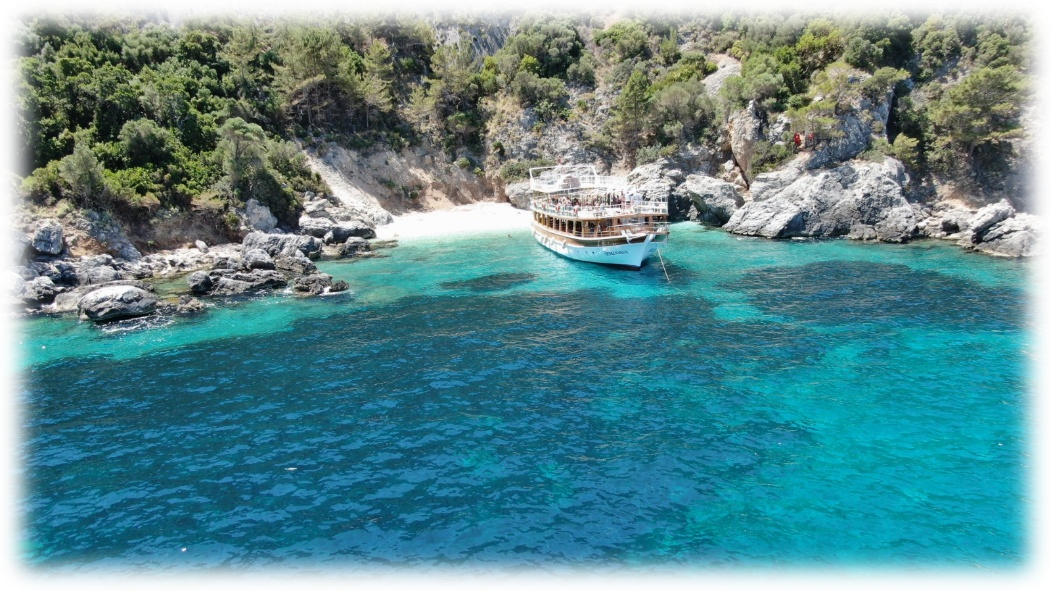
A car will pick up our guests from KoruMar De Luxe Hotel and bring them to the port of Güvercinada. A boat, just for our group, will pick up the group and sail towards Milli Park. The boat will stop at some bays so our guests can swim in the beautiful blue and turquoise water.
After 3 hours the boat will come back to the Güvercinada Port and our ride will bring the group back to the KoruMar De Luxe Hotel.
| 13:30 | Departure from Hotel |
| 14:00 | Sailing from Güvercinada Port |
| 17:30 | Arrival to Güvercinada Port |
| 17:45 | Arrival to KoruMar De Luxe Hotel |
Included Services: Boat tour, R/T transfer from hotel to boat.
Non-Included Services: All other expenses and drinks
Per Person: 65.-EU (based on minimum of 15 participants)
CORRESPONDENCE
For full information about the Symposium please write to Fengshan Liu and Kyle Daun (Symposium Co-Chairs) or to İlker Tari (Symposium Secretary).
Conference Co-Chairs
|
Dr. Fengshan Liu Aerosol & Gas Metrology Metrology Research Centre National Research Council Canada E-mail: fengshan.liu@nrc-cnrc.gc.ca |
Prof. Kyle Daun Director of Waterloo Laboratory for Inverse Analysis and Thermal Sciences (WatLIT) Department of Mechanical and Mechatronics Engineering University of Waterloo E-mail: kjdaun@uwaterloo.ca |
ICHMT Secretary-General
Prof. İlker Tari
Mechanical Engineering Department
Middle East Technical University
06800 Ankara, Turkiye
Tel: +90 312-210-2551
E-mail: ilker@ichmt.org
GENERAL INFORMATION ABOUT ICHMT
The International Centre for Heat and Mass Transfer (ICHMT) is an international, professional, non-governmental, non-profit organization. The general objective of the Centre is to promote and to foster international cooperation in the science of heat and mass transfer and its applications. Its secretariat is located at the Mechanical Engineering Department of Middle East Technical University (METU).
 |
The first meeting of the International Centre for Heat and Mass Transfer (ICHMT) was held in Herceg Novi, Yugoslavia, on September 16, 1968, during the International Seminar on Heat and Mass Transfer in Turbulent Boundary Layers, organized by the Boris Kidric at the Institute of Nuclear Sciences in Belgrade. This meeting was the culmination of activities initiated by a group of leading scientists in the field from different countries. These activities resulted from a long felt need to create an international organization in the fast growing field of heat and mass transfer. Some of the most prominent names in the field who were involved in the founding and creation of the Centre were: E.A. Brun, E.R.G. Eckert, U. Grigull, J.P. Hartnett, T.F. Irvine, Jr., S.S. Kutateladze, A.V. Luikov, W.M. Rohsenow, D.B. Spalding, and M.A. Styrikovich. The active participation and efforts of D. Velickovic, Z. Zaric and N. Afgan from the Serbian Academy of Sciences and the Boris Kidric Institute of Nuclear Sciences in Belgrade made the founding of the Centre possible. |  |
|
|
The leadership and initiatives of Professor Zoran Zaric and later Professor Naim Afgan made the Centre grow and reach maturity over the years and become a well-known organizer of meetings and other activities with high prestige among scientists and researchers in the field of heat and mass transfer. The meetings have served as a means of conveying and transferring scientific knowledge, technical know-how, and cultural values. The Centre's many publications have become among the most sought after collections of scientific literature in the field. |
The Secretariat of the Centre remained in Belgrade for almost 24 years and traditionally organized one seminar and one symposium a year, usually in Dubrovnik, Yugoslavia, until early 1990s when the start of the political turmoil in former Yugoslavia unavoidably hampered the functioning of the Secretariat. The Executive Committee of the Centre started looking for a new home for the Secretariat of the Centre.
 |
Professor Sadik Kakac, a member of the Scientific Council representing Turkey, with the encouragement of Professor Yasuo Mori, the President of ICHMT, and Professor Franz Mayinger, the Chairman of the Executive Committee, contacted Professor Kemal Guruz, Head of TUBITAK (Scientific and Technical Reaserach Council of Turkey), and Professor Suha Sevuk, President of METU (Middle East Technical University in Ankara, Turkey), and urged them to prepare a joint proposal. These efforts took more than a year. In September 1992, the proposals from institutions in seven countries were examined at an Executive Committee meeting in Rome, and it was decided, with a majority vote, that the joint proposal of METU and TUBITAK, could provide the best financial and administrative support to the Centre. Since January 1993, the Centre has restarted its activities in its new home, the Middle East Technical University in Ankara, Turkey, under the joint auspices of these institutions, METU and TUBITAK. |
| The Statutes and the By-Laws of the Centre were revised, partly in response to the move to Turkey. At the meetings of the General Assembly and of the Scientific Council in Brighton, England in August, 1994, Professor Faruk Arinç, a faculty member at the Department of Mechanical Engineering of METU, was elected as the new Secretary General of the Centre. He was re-elected to this office at the succeeding Scientific Council meetings held in every four years during International Heat Tranfer Conferences (IHTC). |  |
 |
The new Secretariat working under the new rules with renewed enthusiasm and support of the Executive Committee as well as the two standing sponsors of the Centre in Turkey, organized highly successful meetings since 1994, and sponsored many others elsewhere. The venues of the meetings in Turkey were chosen to be five-star hotels on the Aegean or Mediterranean coast, providing excellent settings for scientific as well as social gathering of all attendees and spouses. ICHMT also organizes meetings in countries other than Turkey, chaired by prominent researchers in the field. The traditional activity of ICHMT is organization the International Symposia and Seminars. These meetings have been always met with increasing interest by the scientific, technical and industrial communities. The general scope of the meetings has always been designed with the aim of active promotion of interesting scientific work and achievements at high technical levels. |
The Centre has published over 80 Proceedings on various specific aspects of heat and mass transfer. Each proceeding is related to a meeting of the Centre. International participation in the meetings is always a major aim. The total number of participants in the meetings of ICHMT since 1968 has been over 5000, coming from over 60 different countries.
 |
In order to promote the international activities of the Centre and reach as many scientists and researchers as possible in the field, the Centre signed a publication agreement with the publisher, Begell House, Inc., in 1994, since when Begell House has been printing and distributing the scientific work of ICHMT. In addition, the Proceedings of the Biotransport-98, Plasma-99, Turbine-2000 and Vim-2001 symposia were published in the Annals of New York Academy of Sciences (NYAS) in accordance with a separate agreement signed between the Centre and the Academy. In June 2006, the agreement between ICHMT and Begell House, Inc. was renewed and expanded to include the creation of an ICHMT Digital Library Online (http://dl.begellhouse.com/references/1bb331655c289a0a.html). |
As emphasized in our Mission Statement, the Centre aims not only to provide attractive meeting occasions for all scientists active in the field, but also to foster international exchange of science and engineering in all branches of heat and mass transfer through the promotion of research, education, and the exchange of personnel. With this purpose of existence in mind, the Centre aims to be a reliable and state-of-the-art source of information in all its publications, and to create the means for generating international synergy, enthusiasm, and motivation among the scientists and researchers that will lead to new ideas, procedures, products, and standards to improve productivity and efficiency and to promote living in a cleaner environment.
The membership in the Centre is open to all non-governmental, non-profit, national and international organizations working in the field of heat and mass transfer. The number of member institutions of the Centre is now over 40 from 30 different countries.
One activity initiated by the Secretariat of the Centre in 1994 was the creation of the ICHMT Home Page on the Internet. This site is constantly updated, and has now grown to a significant size. It is being accessed by scientists all over the world.
AWARDS
Call for Nominations: The 2025 Elsevier/JQSRT Poynting Award on Radiative Transfer
We announce that Elsevier/JQSRT solicits nominations for the 2025 Poynting Award on Radiative Transfer.
The Award is to celebrate the life-time achievements of an individual scientist who has made landmark original contributions to the research field of radiative transfer and its applications. The Award will be administered by the Editorial Board and Publisher of the Journal of Quantitative Spectroscopy and Radiative Transfer. Nominations of scientists of all nationalities will be considered. The selection committee will consist of two Editors-in-Chief of JQSRT, four Associate Editors of the Journal, and three distinguished members of the radiative transfer community.
On behalf of the Poynting Award Committee, we invite you to nominate an outstanding candidate for the 2025 Award. Each nomination (in the form of a single pdf file) must consist of a nomination letter, the nominee’s CV and publications list, and three 2-page letters of support.
Nominations should be submitted by April 1, 2025 to Dr. Andrew Lacis at andrew.a.lacis@nasa.gov, Professor M. Pinar Mengüç at pinar.menguc@ozyegin.edu.tr and Professor Ping Yang at pyang@geos.tamu.edu. Self-nominations will not be considered.
The award will be presented at the forthcoming 11th International Symposium on Radiative Transfer, RAD-25 in Kuşadasi, Türkiye (15 – 20 June 2025).
The announcement and nomination details are available on the Award section of the JQSRT website.
-------------------------------------------------------------------------------------------------------------------------------
Call for Nominations: The 2025 Elsevier/JQSRT Raymond Viskanta Young Scientist Award
This Elsevier/JQSRT Young Scientist award in the category of Radiative Transfer is named after Professor Raymond Viskanta of Purdue University (West Lafayette, Indiana, USA) to honor his profound contributions to the field of Radiative Transfer since 1950s.
The 2025 Elsevier/JQSRT Raymond Viskanta Award is open to early-career scientists and engineers who work on the theory and application of radiative transfer. There will be one award to be presented at the 11th International Symposium on Radiative Transfer, RAD-25 in Kuşadasi, Türkiye, between 15-20 June 2025.
A nominee for the award:
- can be an undergraduate, a graduate or a post-graduate student, or in his/her early career path with an outstanding record of scholarship and/or applications;
- may not have received a JQSRT Young Scientist Award previously;
- must have published in JQSRT previously (although this requirement may be relaxed in exceptional cases);
- must be under 37 years of age on June 1, 2025 and must have finished his/her PhD within the 10 years preceding that date;
- must present a paper at RAD-25;
- must attend the award ceremony at RAD-25.
The recipients of the award will receive a monetary prize of USD 750 and an official certificate. The winner will be selected by an extensive committee whose members include two JQSRT Editors-in-Chief and two RAD-2025 Chairs, and several other respected members of the community.
The complete nomination package of a candidate should be e-mailed to M. Pinar Mengüç (pinar.menguc@ozyegin.edu.tr), Fengshan Liu (fengshan.liu@nrc-cnrc.gc.ca), Kyle Daun (kjdaun@uwaterloo.ca) by April 1, 2025. The package, in the form of a single PDF file, should include a cover letter, the curriculum vita, three letters of support, and up to 5 best peer-reviewed journal papers.

